- Clone
- TM-β1 (See other available formats)
- Regulatory Status
- RUO
- Other Names
- IL-2 Receptor β chain, IL-2Rβ
- Isotype
- Rat IgG2b, κ
- Ave. Rating
- Submit a Review
- Product Citations
- publications
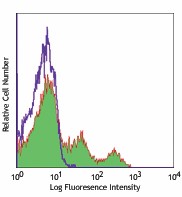
-

C57BL/6 mouse splenocytes stained with TM-β1 PE
| Cat # | Size | Price | Quantity Check Availability | Save | ||
|---|---|---|---|---|---|---|
| 123209 | 25 µg | 86 CHF | ||||
| 123210 | 100 µg | 214 CHF | ||||
CD122 is a 70-75 kD IL-2 receptor β chain also known as IL-2Rβ, which is also shared by the IL-15 receptor. It is constitutively expressed by NK cells and at lower levels by T cells, B cells, monocytes, and macrophages. The IL-2Rβ chain can combine with either the common γ subunit (γc, CD132) alone or with the γc subunit and the IL-2Rα subunit (CD25) to generate intermediate or high affinity IL-2 receptor complexes, respectively. CD122 expression levels can be upregulated by activation. The TM-β1 antibody does inhibit IL-2 binding to the IL-2 receptor. CD122 is expressed on murine, but not human, CD8+ Tregs involved in the maintenance of T cell homeostasis.
Product DetailsProduct Details
- Verified Reactivity
- Mouse
- Antibody Type
- Monoclonal
- Host Species
- Rat
- Immunogen
- Rat T cell line expressing mouse CD122 ( IL-2Rβ)
- Formulation
- Phosphate-buffered solution, pH 7.2, containing 0.09% sodium azide.
- Preparation
- The antibody was purified by affinity chromatography, and conjugated with PE under optimal conditions.
- Concentration
- 0.2 mg/ml
- Storage & Handling
- The antibody solution should be stored undiluted between 2°C and 8°C, and protected from prolonged exposure to light. Do not freeze.
- Application
-
FC - Quality tested
- Recommended Usage
-
Each lot of this antibody is quality control tested by immunofluorescent staining with flow cytometric analysis. For flow cytometric staining, the suggested use of this reagent is ≤ 0.25 µg per 106 cells in 100 µl volume. It is recommended that the reagent be titrated for optimal performance for each application.
- Excitation Laser
-
Blue Laser (488 nm)
Green Laser (532 nm)/Yellow-Green Laser (561 nm)
- Application Notes
-
Additional reported applications (for the relevant formats) include: immunoprecipitation1, blocking of IL-2 binding1, and NK cell depletion2 in vivo. The LEAF™ purified antibody (Endotoxin <0.1 EU/µg, Azide-Free, 0.2 µm filtered) is recommended for blocking of IL-2 binding in vivo and in vitro (Cat. No. 123204).
-
Application References
(PubMed link indicates BioLegend citation) -
- Tanaka T, et al. 1991. J. Immunol. 147:2222.
- Tanaka T, et al. 1993. J. Exp. Med. 178:1103.
- Tanaka T, et al. 1992. Int. Immunol. 4:487.
- Product Citations
-
- RRID
-
AB_940617 (BioLegend Cat. No. 123209)
AB_940617 (BioLegend Cat. No. 123210)
Antigen Details
- Structure
- Ig superfamily, forms high affinity IL-2 receptor with CD25 and CD132 chains or intermediate affinity receptor with CD132 alone, 70-75 kD
- Distribution
- T and B cells, NK cells, monocytes, macrophages
- Function
- Critical component of IL-2 and IL-15 signaling
- Ligand/Receptor
- IL-2, IL-15
- Cell Type
- B cells, Macrophages, Monocytes, NK cells, T cells, Tregs
- Biology Area
- Immunology
- Molecular Family
- CD Molecules, Cytokine/Chemokine Receptors
- Antigen References
-
1. Barclay A, et al. 1997. The Leukocyte Antigen FactsBook Academic Press.
2. Minami Y, et al. 1993. Annu. Rev. Immunol. 11:245.
3. Suzuki H, et al. 1995. Science 268:1472.
4. Shi Z, et al. 2009. Eur. J. Immunol. 39:2109. - Gene ID
- 16185 View all products for this Gene ID
- UniProt
- View information about CD122 on UniProt.org
Related FAQs
- What type of PE do you use in your conjugates?
- We use R-PE in our conjugates.
Other Formats
View All CD122 Reagents Request Custom Conjugation| Description | Clone | Applications |
|---|---|---|
| Biotin anti-mouse CD122 (IL-2Rβ) | TM-β1 | FC |
| FITC anti-mouse CD122 (IL-2Rβ) | TM-β1 | FC |
| PE anti-mouse CD122 (IL-2Rβ) | TM-β1 | FC |
| PerCP/Cyanine5.5 anti-mouse CD122 (IL-2Rβ) | TM-β1 | FC |
| APC anti-mouse CD122 (IL-2Rβ) | TM-β1 | FC |
| PE/Cyanine7 anti-mouse CD122 (IL-2Rβ) | TM-β1 | FC |
| PE/Dazzle™ 594 anti-mouse CD122 (IL-2Rβ) | TM-β1 | FC |
| PE/Cyanine5 anti-mouse CD122 (IL-2Rβ) | TM-β1 | FC |
| APC/Cyanine7 anti-mouse CD122 (IL-2Rβ) | TM-β1 | FC |
| Ultra-LEAF™ Purified anti-mouse CD122 (IL-2Rβ) | TM-β1 | FC,IP,Block,Depletion |
| Brilliant Violet 421™ anti-mouse CD122 (IL-2Rβ) | TM-β1 | FC |
Customers Also Purchased
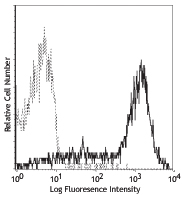
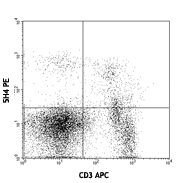
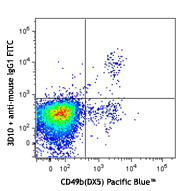
Compare Data Across All Formats
This data display is provided for general comparisons between formats.
Your actual data may vary due to variations in samples, target cells, instruments and their settings, staining conditions, and other factors.
If you need assistance with selecting the best format contact our expert technical support team.
-
Biotin anti-mouse CD122 (IL-2Rβ)
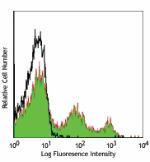
C57BL/6 mouse splenocytes stained with biotinylated TM-β1, f... -
FITC anti-mouse CD122 (IL-2Rβ)
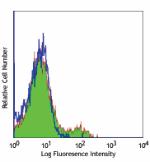
C57BL/6 mouse splenocytes stained with TM-β1 FITC -
PE anti-mouse CD122 (IL-2Rβ)
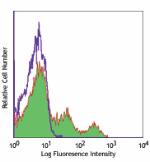
C57BL/6 mouse splenocytes stained with TM-β1 PE -
PerCP/Cyanine5.5 anti-mouse CD122 (IL-2Rβ)
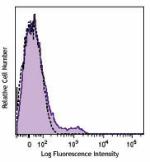
C57BL/6 mouse splenocytes were stained with CD122 (clone TM-... -
APC anti-mouse CD122 (IL-2Rβ)
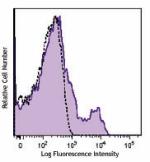
C57BL/6 mouse splenocytes were stained with CD122 (clone TM-... -
PE/Cyanine7 anti-mouse CD122 (IL-2Rβ)
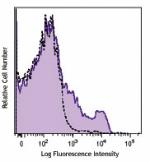
C57BL/6 mouse splenocytes were stained with CD122 (clone TM-... -
PE/Dazzle™ 594 anti-mouse CD122 (IL-2Rβ)
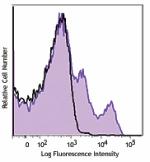
C57BL/6 mouse splenocytes were stained with CD122 (clone TM-... -
PE/Cyanine5 anti-mouse CD122 (IL-2Rβ)

C57BL/6 mouse splenocytes were stained with CD122 (clone TM-... -
APC/Cyanine7 anti-mouse CD122 (IL-2Rβ)

C57BL/6 mouse splenocytes were stained with NK-1.1 FITC and ... -
Ultra-LEAF™ Purified anti-mouse CD122 (IL-2Rβ)

C57BL/6 mouse splenocytes stained with NK-1.1 APC and CD122 ... -
Brilliant Violet 421™ anti-mouse CD122 (IL-2Rβ)

C57BL/6 mouse splenocytes were stained with anti-mouse NK-1....
 Login / Register
Login / Register 










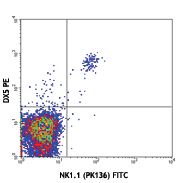



Follow Us